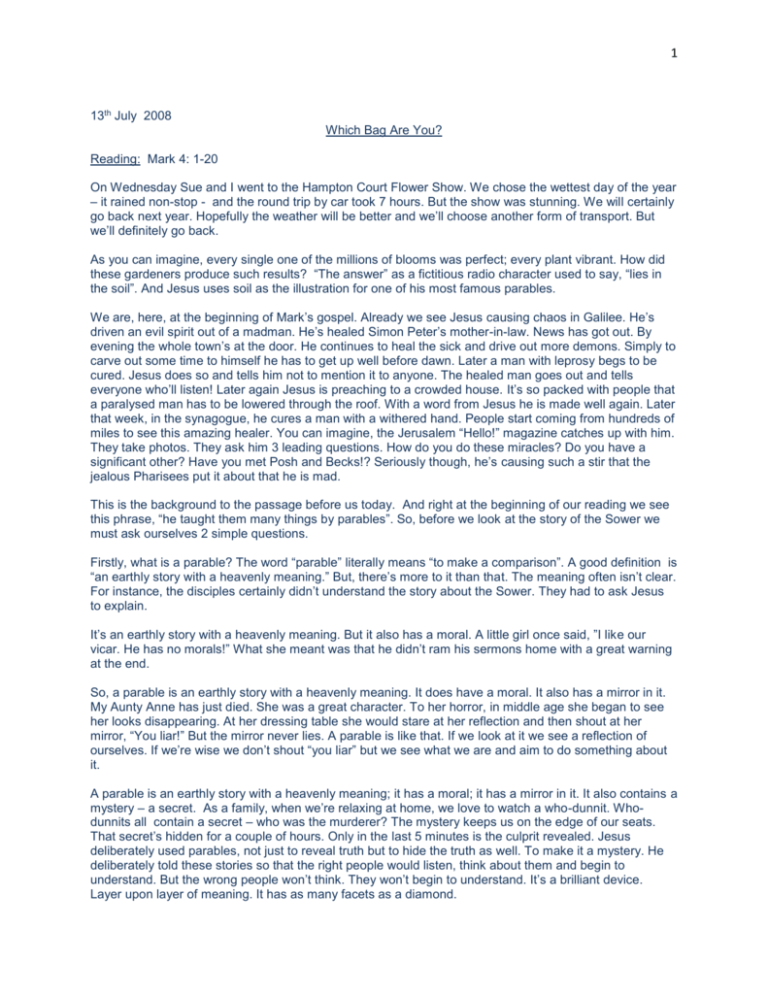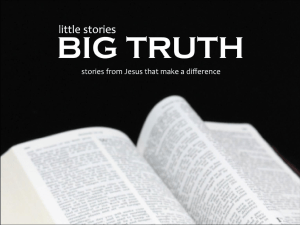080713whbag - Bures Parish Church
advertisement

1 13th July 2008 Which Bag Are You? Reading: Mark 4: 1-20 On Wednesday Sue and I went to the Hampton Court Flower Show. We chose the wettest day of the year – it rained non-stop - and the round trip by car took 7 hours. But the show was stunning. We will certainly go back next year. Hopefully the weather will be better and we’ll choose another form of transport. But we’ll definitely go back. As you can imagine, every single one of the millions of blooms was perfect; every plant vibrant. How did these gardeners produce such results? “The answer” as a fictitious radio character used to say, “lies in the soil”. And Jesus uses soil as the illustration for one of his most famous parables. We are, here, at the beginning of Mark’s gospel. Already we see Jesus causing chaos in Galilee. He’s driven an evil spirit out of a madman. He’s healed Simon Peter’s mother-in-law. News has got out. By evening the whole town’s at the door. He continues to heal the sick and drive out more demons. Simply to carve out some time to himself he has to get up well before dawn. Later a man with leprosy begs to be cured. Jesus does so and tells him not to mention it to anyone. The healed man goes out and tells everyone who’ll listen! Later again Jesus is preaching to a crowded house. It’s so packed with people that a paralysed man has to be lowered through the roof. With a word from Jesus he is made well again. Later that week, in the synagogue, he cures a man with a withered hand. People start coming from hundreds of miles to see this amazing healer. You can imagine, the Jerusalem “Hello!” magazine catches up with him. They take photos. They ask him 3 leading questions. How do you do these miracles? Do you have a significant other? Have you met Posh and Becks!? Seriously though, he’s causing such a stir that the jealous Pharisees put it about that he is mad. This is the background to the passage before us today. And right at the beginning of our reading we see this phrase, “he taught them many things by parables”. So, before we look at the story of the Sower we must ask ourselves 2 simple questions. Firstly, what is a parable? The word “parable” literally means “to make a comparison”. A good definition is “an earthly story with a heavenly meaning.” But, there’s more to it than that. The meaning often isn’t clear. For instance, the disciples certainly didn’t understand the story about the Sower. They had to ask Jesus to explain. It’s an earthly story with a heavenly meaning. But it also has a moral. A little girl once said, ”I like our vicar. He has no morals!” What she meant was that he didn’t ram his sermons home with a great warning at the end. So, a parable is an earthly story with a heavenly meaning. It does have a moral. It also has a mirror in it. My Aunty Anne has just died. She was a great character. To her horror, in middle age she began to see her looks disappearing. At her dressing table she would stare at her reflection and then shout at her mirror, “You liar!” But the mirror never lies. A parable is like that. If we look at it we see a reflection of ourselves. If we’re wise we don’t shout “you liar” but we see what we are and aim to do something about it. A parable is an earthly story with a heavenly meaning; it has a moral; it has a mirror in it. It also contains a mystery – a secret. As a family, when we’re relaxing at home, we love to watch a who-dunnit. Whodunnits all contain a secret – who was the murderer? The mystery keeps us on the edge of our seats. That secret’s hidden for a couple of hours. Only in the last 5 minutes is the culprit revealed. Jesus deliberately used parables, not just to reveal truth but to hide the truth as well. To make it a mystery. He deliberately told these stories so that the right people would listen, think about them and begin to understand. But the wrong people won’t think. They won’t begin to understand. It’s a brilliant device. Layer upon layer of meaning. It has as many facets as a diamond. 2 Second question, who did Jesus speak to in these parables? Here he’s by the lake. The crowd’s so big that he sits in a boat. The listeners stand on the shore. Sensation seekers, passers-by, religious people, genuine searchers after truth – they were all there. Jesus realises there are basically 4 types of people he’s speaking to. He cleverly addresses each group by describing them as different types of soil. Compare this with the people Jesus spoke to in the parable of the Prodigal Son. In the 50s Hollywood produced a film of this story vividly illustrating the adventures and the debauchery of the wayward younger son. It finished with him rushing back into his Father’s arms. But the film had missed the point. The story isn’t all about the younger son but mainly about the jealous, sulking older son. Why? Because Jesus told this parable to a crowd which contained aggressive, muttering Pharisees. Collectively they were the older brother. All around them there were people excited about what Jesus had done. Yet they, the religious leaders, who should have been rejoicing about these wonderful things that were happening in their midst , remained moaning, questioning and in a huff. Jesus didn’t speak randomly. He knew precisely who he was talking to. He knew exactly the time, the place and the situation to tell each of his parables. And they were loaded with meaning for everyone, especially for us who live today in the 21 st century. So, back to the shore. Jesus tells of a Middle Eastern farmer who goes out to sow. He doesn’t sow in neat rows or drills like we might in our veggie patch. He literally “broadcasts” his seed over a wide area, throwing them out as evenly and as far as possible as he walks along. And here Jesus is comparing the sower to a preacher preaching the Word. It’s worth noting that there’s nothing wrong with the seed. It’s strong and powerful. It seems odd to say that when we look at the small, shrivelled pea-like things we get out of a packet. But given the right conditions they can lift concrete or grow into mighty trees. No, there’s nothing wrong with the sower’s seed. It’s where it falls that makes the difference. The first patch of land that Jesus mentions is the path. In the Middle East, like our allotments here, there are paths between each planting area. These pathways are beaten down with constant walking, baked hard by the sun. No chance of germinating here. The seeds just bounce a couple of times and lie there for the birds to gobble them up. Some people are like that. They may listen to a sermon or have the gospel explained to them by a friend but it doesn’t go in and by the time they get home it’s all forgotten. The second patch of land is rocky. The soil’s too thin to plough or dig. Roots can’t go down. The response from the seed is quick as it seeks to find nourishment but it soon withers and dies. And there are people like that too. They are immediately excited about the message but that excitement soon fades as the World’s fads or thrills catch their wandering eyes. The third patch contains good soil but it’s been infiltrated by weeds. And in the fertile soil of Israel thistles can grow up to 6 feet high. The seed falls among the thorns. It’s choked by the roots and stems of these robust weeds. It never has a chance. Again there are many people like that. They fill their lives with many things and a lot of those can be very good, like charity or church work but somehow the life-changing power of the seed, the gospel , never has a chance to take root. By this time you’d think the sower , the preacher, might give up. All this sowing and no results at all. But here’s the great news. Remember the seed is OK. All it needs is good soil. And at last it finds it. Good rich soil, ploughed, weed-free, deep and full of nutrients. And look at the results – a tremendous crop – seeds multiplying themselves by 30, 60 or even 100 times. As Christians we can get so depressed, can’t we, when talk to others and see our words fall on the path, the rocky ground or among the weeds. Nothing seems to happen for years. But the good news is that when the seed does land on fertile soil the results far outweigh the barren times. The 30, 60, 100fold hugely outnumbers the crop that was lost. And the extraordinary thing is that the seed we’ve sown can have fallen on good soil, without even our knowing it. Willy Mullen was a petty criminal. He was planning another robbery when he happened to pass a mission. He wandered in. The preacher’s words struck home. After he left he gave his life to Christ. Years later Willy heard that that preacher was dying. He went to visit him. “You don’t remember me, Sir,” said Willy, “but I was converted in a mission of yours many years ago”. “Which one?” asked the preacher. Willy told him. “Oh, I remember that one. I was so depressed because no-one seemed touched by my words. I felt a complete failure.” Willie then explained what had happened to him since. Not only had he become a 3 Christian but he had led thousands of people to Christ himself. The preacher then realised that, far from being totally fruitless, that mission had, through Willy, had been his most successful. He died a happy man. In the early 1940s all foreign missionaries were thrown out of Ethiopia as Mussolini’s troops trampled in. Just before they had to leave one missionary told a blind beggar about Jesus. At the end of that decade Ethiopia opened up again. The missionary returned, fearing what he’d find. He discovered that this one blind beggar had himself brought 3,000 others to faith. That one seed in good ground was all that it took. These days we tend to buy soil in bags. I wonder how many bags must have been used at Hampton Court this week. Hundreds of thousands, I‘d guess. I’m told that one of the best bags of soil we can buy for our gardens is John Innes Compost No 1.The label tells us that it contains the perfect mix of loam, peat, sand, limestone, hoof and horn meal, superphosphate and potassium sulphate. It’s just begging for seeds to jump into it and grow like crazy! Jesus says to each of us, “Imagine yours lives as different types of soil; different landing areas on which my seed will fall. How receptive are you to my words? How obedient are you to my commands? How willing are you to change your lives as I speak to you?” Let’s envisage 4 bags lined up in a row at a modern garden centre. The label on the first says, “hard sunbaked clay”. The label on the second says, “broken rocks”. The label on the third says, “good soil but mixed with thistles, dandelion, bindweed and ground elder. ”The label on the fourth says, “John Innes Compost N0. 1.” Jesus quietly comes along beside us and whispers in our ear: ”Tell me, which one of these bags are you?”








